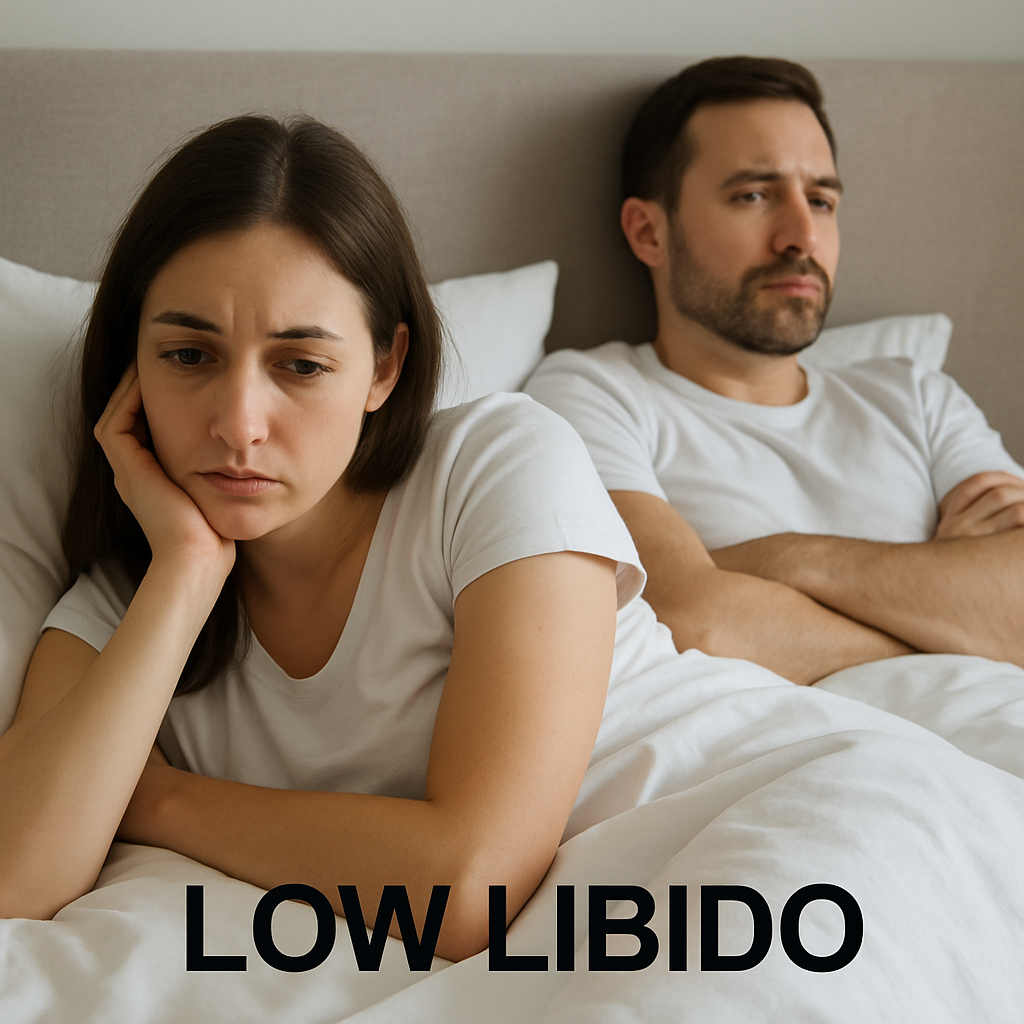+918048040832

This is your website preview.
Currently it only shows your basic business info. Start adding relevant business details such as description, images and products or services to gain your customers attention by using Boost 360 android app / iOS App / web portal.
Low Libido (Decreased Sex Drive) Low libido, or...

Low Libido (Decreased Sex Drive) Low libido, or a decreased interest in sexual activity, is a common condition that can affect both men and women at any stage of life. It’s often a sign that something is amiss, either physically, emotionally, or psychologically. While occasional dips in libido are normal, a persistent lack of interest in sex can significantly impact relationships, self-esteem, and overall well-being. Understanding Low Libido: Libido refers to a person’s overall sexual drive or desire. When this desire decreases or disappears, it can be a source of distress. The causes of low libido are varied and complex, and they can stem from both internal (biological) and external (environmental or relationship) factors. Physical Causes: Several physical factors may contribute to a decline in libido. Hormonal imbalances, such as low testosterone or estrogen, can have a direct impact on sexual desire. This is especially common in women during menopause or men as they age. Chronic illnesses such as diabetes, heart disease, and thyroid disorders can also affect libido by altering hormone levels or reducing overall energy levels. Additionally, certain medications—such as antidepressants, birth control, or blood pressure drugs—may cause sexual side effects that lead to a reduced interest in sex. Psychological Factors: Mental health plays a crucial role in sexual desire. Stress, anxiety, and depression are some of the most common psychological causes of low libido. Emotional struggles, such as past trauma, relationship issues, or feelings of guilt or shame about sex, can also create significant barriers to sexual desire. In some cases, a lack of libido is linked to body image issues or low self-esteem, which can make individuals feel unattractive or unworthy of sexual intimacy. Lifestyle and Relationship Factors: Lifestyle choices and relationship dynamics can also contribute to a decrease in libido. Poor sleep habits, lack of exercise, and unhealthy eating habits can lead to fatigue and a lack of energy, which can lower sexual desire. In addition, stress from work, financial concerns, or family life can sap emotional energy and make intimacy feel less important. Relationships, particularly those with unresolved conflicts, lack of emotional intimacy, or communication problems, can lead to a decrease in sexual attraction or interest. Symptoms of Low Libido: The primary symptom of low libido is a marked reduction in sexual desire. Other signs may include: Avoidance of sexual activity: An individual may actively avoid situations that could lead to sex, even when their partner expresses interest. Decreased sexual thoughts or fantasies: A person may no longer have thoughts or fantasies about sex, which they once enjoyed. Emotional distress: Low libido can cause frustration, guilt, or sadness, particularly when one partner feels that the lack of sexual desire is affecting their relationship. Dissatisfaction with intimacy: An individual might feel disconnected or emotionally distant from their partner due to a lack of sexual closeness. Impact on Relationships: When one partner experiences low libido, it can create tension or frustration within the relationship. The other partner may feel rejected, neglected, or unloved, which can lead to communication breakdowns, arguments, or even emotional withdrawal. Over time, this can lead to feelings of resentment or a diminished emotional connection. Therefore, addressing low libido early is important for preserving the health of both the individual and the relationship. Treatment and Management: The treatment for low libido depends on the underlying cause. A comprehensive approach typically involves addressing the physical, emotional, and relational factors that contribute to the condition. Here are some common treatment options: Medical Intervention: Hormone therapy: For those with hormonal imbalances, hormone replacement therapy (HRT) or testosterone therapy may help restore sexual desire. Medication adjustments: If medication is the culprit, a doctor may adjust the prescription or suggest alternatives with fewer sexual side effects. Addressing underlying medical conditions: Treatment for chronic conditions like diabetes or thyroid disorders can help restore normal sexual function. Psychotherapy: Cognitive Behavioral Therapy (CBT): CBT can be effective for treating low libido caused by stress, anxiety, depression, or negative sexual experiences. Sex therapy: Specialized sex therapy can help individuals or couples work through relationship issues or emotional barriers to intimacy. Lifestyle Changes: Exercise and nutrition: Regular physical activity and a balanced diet can improve energy levels, reduce stress, and enhance sexual health. Sleep and stress management: Better sleep hygiene and relaxation techniques can improve overall well-being and reduce the negative impact of stress. Couples Therapy: If relationship dynamics are contributing to low libido, couples counseling may help improve communication, resolve conflicts, and rebuild emotional and sexual intimacy. When to Seek Help: If low libido is persistent and causing distress, it’s important to seek help from a healthcare professional. A doctor or therapist can evaluate the situation, perform necessary tests, and provide treatment options tailored to the individual’s specific needs. Ignoring the problem can lead to emotional and relational complications, so early intervention is key. Best sexologist in motavarachha surat Best doctor in surat for low libido Best doctor in surat for premature ejaculation Best doctor in surat for erectile dysfunction Best doctor in motavarachha surat for sexual problem due to diabetes

